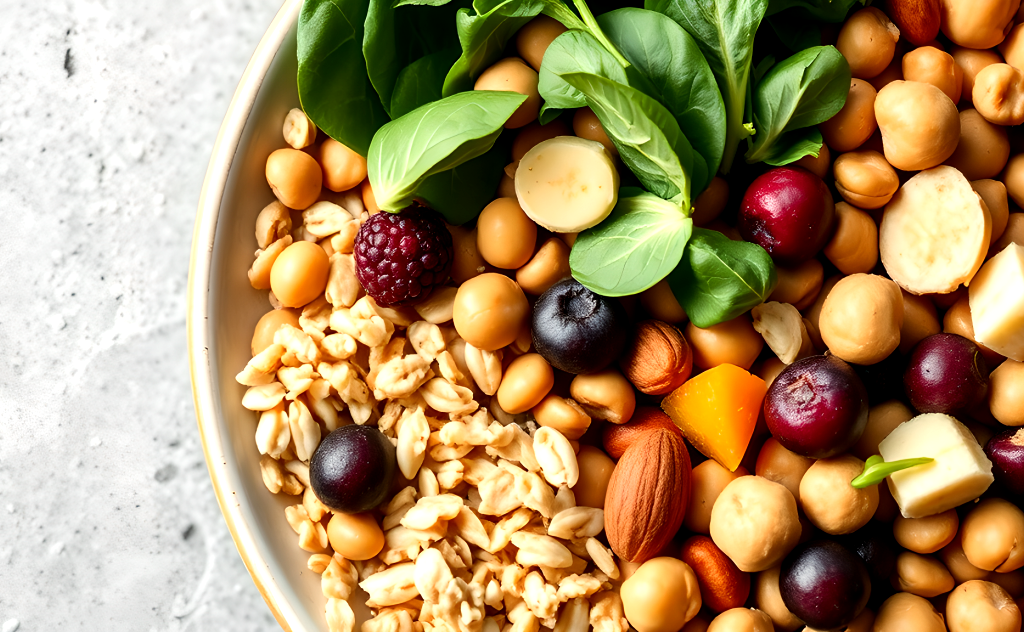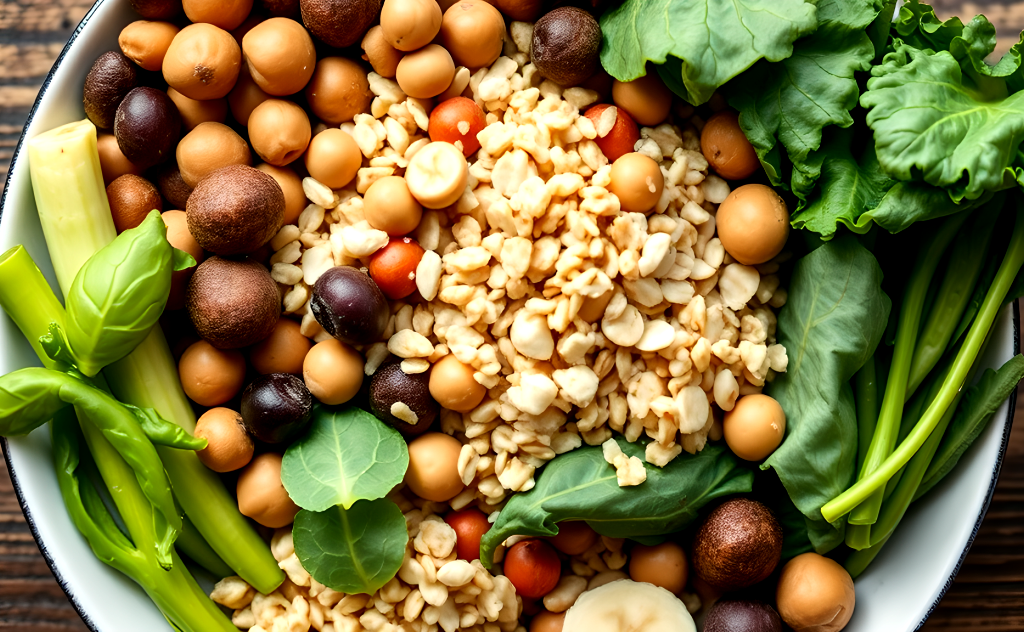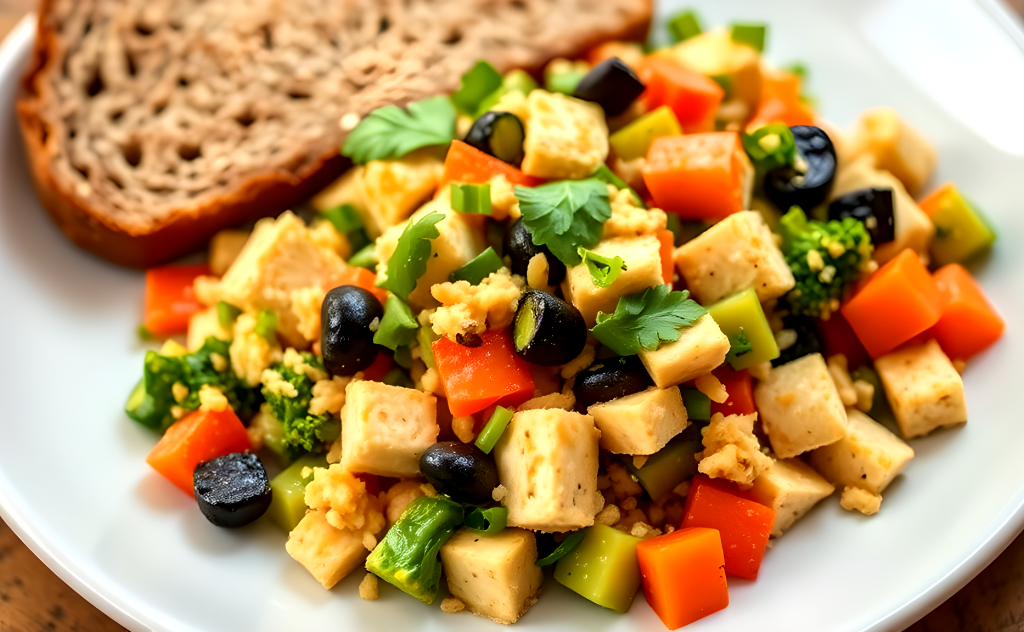Unlock Superhuman Strength with This Secret Plant-Based Diet Hack
What if the key to unlocking your body’s full athletic potential wasn’t found in expensive supplements or extreme training regimens, but in the produce section of your local grocery store? While many athletes still cling to the belief that animal products are essential for peak performance, a growing body of research is revealing a stunning truth: plant-based nutrition isn’t just adequate for serious athletes—it may actually offer a significant competitive edge. From enhanced recovery times to improved oxygen delivery to muscles, elite plant-based athletes are shattering stereotypes and breaking records across the sports world.
The science is clear: a well-designed plant-based diet can help you achieve a leaner body mass, reduce inflammation, and even lower your resting heart rate as effectively as extensive treadmill training! 💪🌱 Studies show that consuming the right balance of plant proteins—from sources like legumes, tofu, and tempeh—supports muscle growth just as effectively as animal proteins when paired with proper training. This isn’t just theory; over 50 elite plant-based athletes have documented their success with this approach, proving that you don’t need to sacrifice performance to align your diet with your values.
In this comprehensive guide, we’ll explore the science behind plant-based nutrition for athletes, break down the essential macronutrients you need for optimal performance, and provide practical implementation strategies for your fitness journey. Whether you’re looking to build serious muscle, enhance your endurance, or simply improve your overall health while maintaining an active lifestyle, you’ll discover exactly how to harness the power of plants to achieve your fitness goals.
The Science Behind Plant-Based Nutrition for Athletes
Recent scientific research has revealed compelling evidence supporting the benefits of plant-based diets for athletic performance. Studies published as recently as November 2024 have demonstrated significant advantages for athletes who adopt a plant-focused nutritional approach.
Research on Body Composition: How Plant-Based Diets Lead to Leaner Body Mass
Plant-based diets naturally increase fiber, antioxidants, and phytochemical intake while simultaneously reducing saturated fat consumption. This nutritional profile directly correlates with a decreased risk of metabolic diseases like diabetes and obesity, which contributes to a leaner body composition. The high fiber content helps regulate appetite and promotes healthy weight management, allowing athletes to maintain optimal body composition for their sport.
The lower saturated fat intake characteristic of plant-based eating patterns helps reduce unwanted body fat while preserving lean muscle mass when combined with appropriate training. These improvements in metabolic syndrome markers create an ideal physiological environment for developing and maintaining a favorable lean-to-fat ratio essential for athletic performance.
Enhanced Recovery: The Role of Antioxidants and Anti-inflammatory Properties
One of the most significant advantages of plant-based nutrition for athletes is the abundance of antioxidants that combat exercise-induced oxidative stress. During intense training, the body produces reactive oxygen species (ROS) that can damage muscle tissue and prolong recovery time. Plant foods are rich in antioxidants that neutralize these harmful compounds, accelerating recovery between training sessions.
The 2024 research highlights that high levels of antioxidants from plant foods bolster the immune system and enhance intestinal microbiota diversity. This improved gut health positively influences lipid profiles and lowers cardiovascular disease risk—creating an optimal internal environment for recovery and adaptation to training stimuli.
Furthermore, many plant foods contain natural anti-inflammatory compounds that help reduce exercise-induced inflammation, allowing athletes to bounce back faster and train more consistently—a critical factor for long-term strength and performance development.
Increased Aerobic Capacity: Benefits for Endurance Performance
Plant-based diets show particular promise for enhancing endurance performance through several physiological mechanisms. Research indicates that vegetarian and vegan diets may positively affect key factors influencing endurance capacity, including mitochondrial density, hemoglobin concentration, and cardiovascular function.
The higher carbohydrate intake typical in plant-based diets provides optimal fuel for aerobic activities, while the lower saturated fat consumption promotes better cardiovascular health. Studies trending toward 2025 have observed improved VO2max measurements in plant-based athletes compared to omnivores, though not all research shows consistent results.
The favorable cardiovascular adaptations seen in plant-based athletes include improved blood flow, enhanced oxygen delivery to working muscles, and better overall heart health—all critical components for superior endurance performance. These adaptations likely stem from the beneficial effects of plant foods on vascular function and blood lipid profiles.
With this understanding of how plant-based nutrition affects the physiological foundations of athletic performance, we can now explore the specific nutrients that power plant-based athletes. In the next section, “Essential Macronutrients for Plant-Based Athletes,” we’ll examine exactly which plant-based foods provide the protein, carbohydrates, and fats necessary to support strength development and overall athletic performance.

Essential Macronutrients for Plant-Based Athletes
Now that we’ve explored the science behind plant-based nutrition for athletes, let’s delve into the specific macronutrient requirements that support optimal performance. As recent research from the University of Exeter indicates, while plant-based diets don’t necessarily enhance athletic performance, they can certainly support it when properly structured around key macronutrients.
A. Carbohydrates: Optimal Intake (5-10g per kg) for Glycogen Replenishment
Carbohydrates remain the primary fuel source for high-intensity exercise and are abundantly available in plant-based diets. For plant-based athletes, consuming 5-10g of carbohydrates per kilogram of body weight is recommended to maintain adequate glycogen stores for training and competition. Fortunately, as the research indicates, carbohydrate intake is generally sufficient in vegan diets, providing ample energy for glycogen replenishment and sustained performance.
Plant-based sources like whole grains, legumes, fruits, and starchy vegetables offer not only carbohydrates but also fiber and micronutrients that support overall health. The key advantage for plant-based athletes is the natural abundance of complex carbohydrates in their diet, which provides sustained energy without the inflammation often associated with refined carbohydrates.
B. Plant Protein: Meeting Requirements (1.2-2.2g per kg) Without Animal Products
According to the referenced research, protein intake tends to be lower in vegan diets, yet athletes require higher amounts—specifically 1.2-2.2g per kilogram of body weight—to support muscle recovery and growth. Meeting these requirements demands strategic food selection.
The quality of plant proteins presents a particular challenge. Plant proteins may contain suboptimal amino acid profiles compared to animal sources, potentially affecting muscle protein synthesis. To address this, plant-based athletes should:
- Consume a variety of protein sources to ensure a complete amino acid profile
- Consider protein combining within meals or throughout the day
- Focus on high-quality plant proteins such as legumes, tofu, tempeh, and seitan
- Potentially supplement with plant-based protein powders that offer fortified amino acid profiles
As noted in the research, careful blending of plant proteins can help achieve the amino acid composition necessary for optimal muscle adaptation and recovery.
C. Healthy Fats: Balancing Omega-3s and Total Fat Intake (20-35% of Calories)
While fat intake can be adequate in vegan diets, particular attention must be paid to essential fatty acids, especially omega-3s. Plant-based athletes should aim for a total fat intake of 20-35% of total calories, with special focus on omega-3 fatty acids that support cardiovascular health, reduce inflammation, and enhance recovery.
Plant sources of omega-3s include:
- Flaxseeds and flaxseed oil
- Chia seeds
- Walnuts
- Hemp seeds
- Algae-based supplements (for direct DHA/EPA)
The research suggests that while overall fat intake isn’t typically problematic for plant-based athletes, the specific fatty acid composition requires careful planning. Since vegan diets lack direct sources of EPA and DHA (typically found in fatty fish), consideration of algae-based supplements may be warranted for optimal performance and recovery.
With these macronutrient foundations established, we’ll next explore how to build a complete plant-based diet for optimal performance, integrating these macronutrients into practical meal plans while addressing potential micronutrient considerations.
Building a Complete Plant-Based Diet for Optimal Performance
Now that we’ve explored the essential macronutrients plant-based athletes need, let’s focus on how to build a complete diet that ensures optimal performance and recovery. A well-structured plant-based diet can provide all the nutrients necessary for athletic success when properly planned.
Six Essential Food Groups for Nutritional Balance
To achieve peak performance on a plant-based diet, athletes should incorporate six essential food groups that collectively provide a complete nutritional profile:
- Legumes – Critical for protein and iron
- Whole Grains – Essential for complex carbohydrates and B vitamins
- Vegetables – Rich in micronutrients and antioxidants
- Fruits – Provide natural sugars, vitamins, and recovery-enhancing compounds
- Nuts and Seeds – Concentrated sources of healthy fats, protein, and minerals
- Fortified Foods – Help address potential nutritional gaps, particularly for vitamin B12
A balanced approach incorporating all these food groups helps prevent the nutritional deficiencies that can occur in poorly structured plant-based diets, as highlighted in the research by David Rogerson.
Key Staple Foods: Legumes, Whole Grains, Vegetables, Fruits, Nuts and Seeds
Legumes: Beans, lentils, chickpeas, and soy products provide complete protein profiles when consumed in variety. These foods are cornerstone protein sources for plant-based athletes looking to build and maintain muscle mass.
Whole Grains: Brown rice, quinoa, oats, and whole wheat provide sustained energy for training sessions. These complex carbohydrates fuel performance while delivering fiber and essential B vitamins.
Vegetables: Dark leafy greens (spinach, kale) are particularly important for iron, while cruciferous vegetables support recovery through their anti-inflammatory properties.
Fruits: Berries, bananas, and citrus fruits provide quick energy and antioxidants that combat exercise-induced oxidative stress.
Nuts and Seeds: Walnuts, flaxseeds, and chia seeds deliver essential omega-3 fatty acids, which are otherwise challenging to obtain on a plant-based diet. Almonds and pumpkin seeds provide calcium and zinc, nutrients that require special attention for vegan athletes.

Caloric Considerations: Ensuring Sufficient Energy for Training and Recovery
One significant challenge for plant-based athletes is consuming adequate calories for performance and recovery. As noted in the reference material, the high fiber content of plant foods promotes satiety, potentially leading to inadvertent caloric deficits. Athletes following a plant-based diet must be mindful of their total energy intake to support their training demands.
Strategies to ensure sufficient caloric intake include:
- Increasing meal frequency throughout the day
- Incorporating calorie-dense foods like avocados, nut butters, and coconut
- Consuming smoothies with added protein powder, fruits, and nut butters
- Timing larger meals around training sessions for optimal energy availability
- Monitoring weight and performance to assess energy adequacy
By focusing on nutrient-dense, calorie-sufficient meals, plant-based athletes can avoid the pitfall of undereating while maximizing nutritional intake for both performance and recovery.
With this comprehensive understanding of building a complete plant-based diet, we’ll next explore how to tailor this approach to meet specific fitness goals through plant-based nutrition, whether you’re focused on endurance, strength, or overall athletic performance.
Meeting Specific Fitness Goals with Plant-Based Nutrition
Now that we’ve covered how to build a complete plant-based diet for optimal performance, let’s explore how to tailor your plant-based nutrition to meet specific fitness goals. Whether you’re focused on endurance, strength building, or weight management, plant-based diets can be strategically optimized for your particular needs.
Endurance Training: Fueling Strategies and Recovery Foods
For endurance athletes, carbohydrates are your primary fuel source. Research shows that 45% to 65% of your total caloric intake should come from carbohydrates, with specific recommendations based on your body weight and activity level. Plant-based diets naturally provide about 4% more carbohydrates than omnivorous diets, making them ideal for endurance activities.
Pre-workout, focus on easily digestible carbohydrates from whole foods rather than processed options. During longer training sessions, replenish with carbohydrate-rich foods to maintain energy levels. Post-workout recovery should include both carbohydrates and proteins to replenish glycogen stores and repair muscle tissue.
Recovery foods particularly beneficial for endurance athletes include:
- Legumes combined with whole grains for complete proteins
- Antioxidant-rich fruits to combat exercise-induced inflammation
- Vitamin E-containing nuts and seeds to support recovery
Strength and Muscle Building: Protein Timing and Amino Acid Optimization
Contrary to popular belief, plant-based diets can provide sufficient protein for muscle building. Athletic individuals should aim for 1.2-2.0 grams of protein per kilogram of body weight daily, depending on training intensity.
For optimal muscle synthesis, focus on:
- Protein timing: Distribute protein intake throughout the day rather than consuming it all at once
- Combining various plant proteins (legumes, tofu, quinoa, nuts, and seeds) to ensure a complete amino acid profile
- Including leucine-rich plant foods to stimulate muscle protein synthesis
As Dr. Hunnes confirms, varied plant-based foods like lentils, beans, nuts, seeds, tofu, and quinoa can adequately meet protein requirements. The improved cardiovascular efficiency from plant-based diets may also contribute to better blood flow to muscles during strength training, potentially enhancing recovery and growth.
Weight Management: Leveraging the Lower Caloric Density of Plant Foods
Plant-based diets typically contain about 5% fewer calories than omnivorous diets, making them naturally conducive to weight management. The higher fiber content of plant foods increases satiety while consuming fewer calories.
For effective weight management:
- Fill half your plate with non-starchy vegetables, as recommended by Dr. Adeyemo
- Leverage the naturally lower caloric density of plant foods while maintaining nutrient density
- Focus on whole foods rather than processed alternatives to maximize nutritional value per calorie
Athletes may need to adjust their intake based on activity level, with an additional 500-1,000 calories beyond the typical 1,500-2,000 daily calories. If experiencing fatigue or poor recovery, this could indicate insufficient caloric intake, warranting consultation with a healthcare professional.
With these specific strategies for different fitness goals in mind, next we’ll explore how to address potential nutritional concerns and supplementation needs that might arise when following a plant-based diet for athletic performance.
Addressing Nutritional Concerns and Supplementation
Now that we’ve explored how to meet specific fitness goals with plant-based nutrition, it’s important to address potential nutritional gaps that might affect your performance and overall health as a plant-based athlete.
Essential Supplements: Vitamin B12, Vitamin D, and Omega-3 Considerations
While a well-planned plant-based diet can provide most nutrients, certain supplements are crucial for optimal athletic performance:
- Vitamin B12: Essential for neurological function and blood cell production, B12 is not adequately found in plant sources. Athletes should supplement with 300-1000 mcg daily to support energy metabolism and recovery.
- Vitamin D: Often deficient regardless of diet due to limited sun exposure, Vitamin D is crucial for bone health and immune function. A daily supplement of 1000-2000 IU of Vitamin D3 is recommended for plant-based athletes.
- Omega-3 Fatty Acids: DHA and EPA, critical for heart and brain health, aren’t efficiently converted from plant-based ALA (found in seeds). Consider a daily supplement of approximately 300 mg of DHA to support recovery and reduce inflammation.
Other beneficial supplements for plant-based athletes include iodine for thyroid function, Vitamin K2 for calcium management, and zinc for immune support and recovery.

The Truth About Soy: Debunking Myths and Highlighting Benefits
Soy has been unfairly maligned in fitness circles, but research supports its benefits for plant-based athletes:
- Contrary to popular myths, soy does not negatively impact hormone levels in men or women
- Soy provides a complete protein profile that supports muscle recovery and growth
- The isoflavones in soy may offer additional health benefits beyond basic nutrition
Incorporating high-quality soy products like tempeh, tofu, and edamame can provide excellent protein options for plant-based strength training.
Iron, Calcium and Other Nutrients: Ensuring Adequate Intake for Athletes
Several micronutrients require special attention on a plant-based diet:
- Iron: Plant-based (non-heme) iron has lower absorption rates. Pair iron-rich foods (lentils, spinach) with vitamin C sources to enhance absorption.
- Calcium: Critical for bone health and muscle function. While available in plant foods like fortified plant milks and leafy greens, absorption can be inhibited by oxalates and phytates in some plant foods.
- Additional Considerations: Selenium, magnesium, and zinc are also important for athletic performance and may require strategic food choices or supplementation.
Remember that supplementation should complement your plant-based diet rather than replace nutrient-dense whole foods. The goal is to enhance your nutritional intake to support optimal athletic performance, not merely survive on a plant-based diet.
With these nutritional considerations addressed, we’ll next explore practical implementation and meal planning to help you incorporate these principles into your daily routine for maximum strength and performance benefits.
Practical Implementation and Meal Planning
Now that we’ve addressed the key nutritional concerns and supplementation strategies for plant-based athletes, it’s time to focus on how to put this knowledge into practice through effective meal planning and implementation strategies.
Transitioning to Plant-Based Eating: Gradual Approaches for Athletes
Making the switch to plant-based eating doesn’t have to happen overnight. A gradual transition can help athletes adapt without disrupting their training or performance. Based on research from experts in the field, here are some approaches to consider:
- Start with plant-based days: Designate certain days of the week as fully plant-based to ease into the lifestyle
- Replace one meal at a time: Begin with breakfast, then lunch, and finally dinner
- Join a community: Connect with like-minded individuals pursuing plant-based health and fitness for support and motivation
- Focus on addition, not subtraction: Instead of thinking about what you’re removing from your diet, concentrate on the nutrient-dense plant foods you’re adding
The key is to make sustainable changes that align with your training goals while ensuring your nutritional needs are consistently met.
Sample Meal Plans and Timing for Training Days
According to researcher David Goldman’s 2024 findings, athletes require specific nutritional adjustments based on their age and sport type. While endurance athletes may need less protein than strength athletes, all athletes benefit from higher protein intake than standard recommendations for optimal muscle and strength development.
Here’s a sample meal plan for plant-based athletes focusing on strength training:
Breakfast:
- Tofu scramble with vegetables and whole grain toast
- Or overnight oats with plant-based protein powder and fruit
Lunch:
- Sweet potato bowl with beans, leafy greens, and avocado
- Or quinoa salad with chickpeas and mixed vegetables
Dinner:
- Lentil pasta with vegetable-rich tomato sauce
- Or chickpea and tofu curry with brown rice
Snacks:
- Nut butter on whole wheat bagel
- Protein smoothie with plant milk and fruits
- Hummus with vegetable sticks

The Physicians Committee for Responsible Medicine recommends spreading protein intake throughout the day rather than concentrating it in one meal, which supports better muscle protein synthesis for athletes.
Pre and Post-Workout Nutrition Strategies
Proper timing of meals is crucial for plant-based athletes to maximize performance and recovery:
Pre-Workout (1-3 hours before):
- Focus on easily digestible carbohydrates with moderate protein
- Examples: Banana with peanut butter, oatmeal with berries, or a small smoothie with plant protein
Immediate Post-Workout (within 30 minutes):
- Emphasize quick-absorbing carbohydrates and protein to kickstart recovery
- Aim for a 3:1 or 4:1 carb-to-protein ratio
- Examples: Plant protein shake with fruit, or chocolate plant milk with a plant-based protein bar
Recovery Meal (1-2 hours post-workout):
- Include complete proteins from combinations of plant foods
- Add anti-inflammatory foods to support recovery
- Examples: Lentil chili with whole grains or tempeh stir-fry with vegetables and brown rice
For athletes focused on fat loss, Goldman advises implementing a gradual caloric reduction to prevent negative impacts on performance and muscle retention. This approach, combined with strategic meal timing around workouts, helps maintain strength while achieving body composition goals on a plant-based diet.
Remember that these plans should be adjusted based on individual needs, training intensity, and specific goals, with special attention to protein, vitamin B12, and other key nutrients that support plant-based strength training.
Unleash Your Full Potential with Plant-Based Power
The journey to superhuman strength doesn’t require animal products – in fact, the evidence suggests quite the opposite. Throughout this guide, we’ve explored how plant-based nutrition provides all the essential macronutrients athletes need, from carbohydrates that fuel high-intensity workouts to plant proteins that build muscle just as effectively as animal sources. We’ve dismantled concerns about nutritional adequacy and provided practical implementation strategies that make this lifestyle sustainable and enjoyable.

Your path to extraordinary strength and performance begins with your next meal. Whether you’re an endurance athlete looking to improve recovery time, a strength trainer aiming to build lean muscle, or simply someone seeking to enhance overall fitness, the plant-based approach offers a powerful, evidence-backed strategy. Remember, this isn’t about restriction—it’s about abundance, variety, and unlocking your body’s true potential. Join the growing community of elite plant-based athletes who have discovered this secret: the strongest animals on the planet eat plants, and with the knowledge from this guide, you can harness that same power for yourself.

